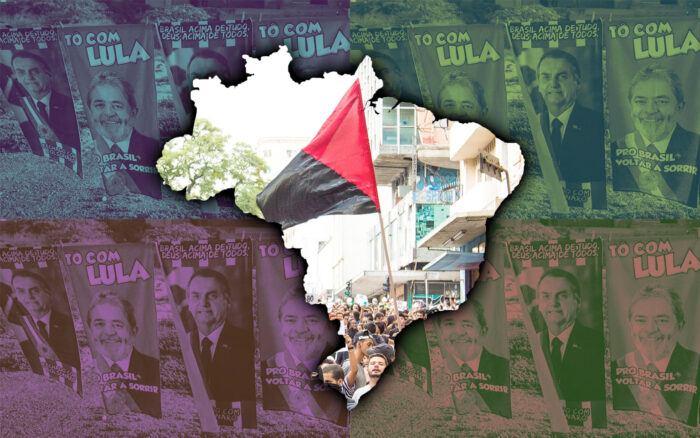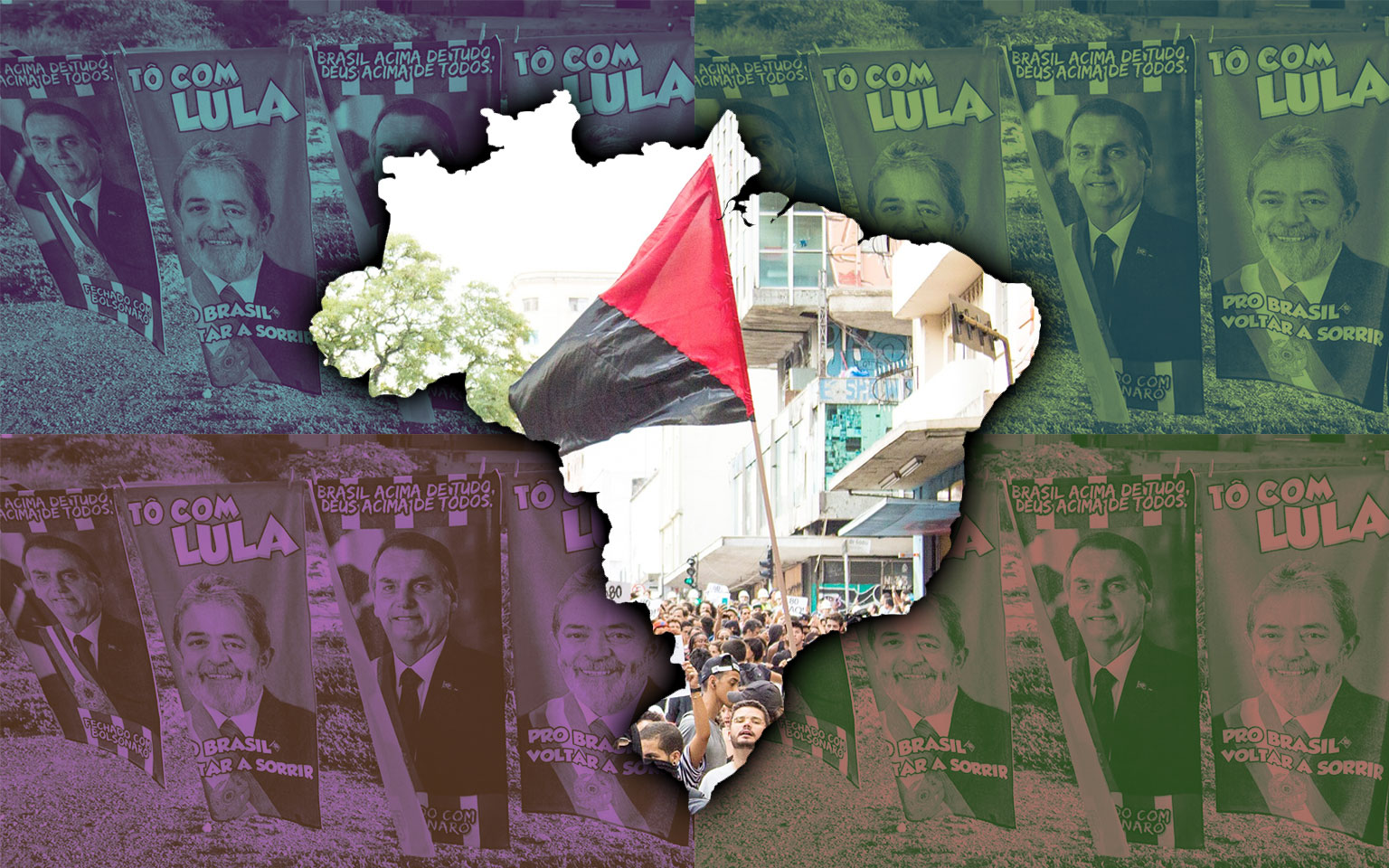
Bruno Lima Rocha is a political scientist, professional journalist and professor of international relations based in Brazil, and is a member of the editorial board of the Institute for Anarchist Theory and History (IATH-ITHA).
The following interview has been lightly edited for clarity.
Black Rose / Rosa Negra (BRRN): Looming over much of the political landscape in Brazil is the presidential election, in which former president Lula da Silva is expected to win in the second round over incumbent Jair Bolsonaro, in part by taking up space in the political center. How has this election campaign impacted social forces on the left and the right in Brazil?
Bruno Lima Rocha (BLR): In the first round of the general elections, Lula (PT plus eight parties) had just over 48% of the votes and Bolsonaro 43.5%. It gives an average of about 6 million votes, in a universe of 156 million voters, in a total with 20% abstention. The number of null and blank votes was low compared to other years. On the far left, we had candidacies from small parties such as Popular Unity (of Maoist origin), PCO (a line of Trotskyism), PSTU (Trotskyist Morenism) and PCB (neo-Stalinists). In all 26 states and the Federal District, the set of these small electoral parties more to the left does not reach 2% of the electorate. Thus, the left’s space in the political debate is small, because the program of Lula and his deputy Geraldo Alckmin could be called social-liberal: social democrat in social policies and post-neoliberal in economic policy and state design. The radicalism in this election is marked by the extreme right, with Bolsonaro and his version of tropical Trumpism.
BRRN: Despite the glowing picture that progressives and social democrats paint of Lula, it was under the PT (Worker’s Party) that Brazil’s government made its turn toward austerity. Given that this will likely be a second term in office for him, how effective do you think left organizations and movements will be at wringing concessions from a Lula-led PT government?
BLR: The turn to “austerity” took place in Dilma’s second government (January 2015 until her impeachment without legal cause, in April 2016), when the re-elected president appointed economist Joaquim Levy, a Chicago Boy, as finance minister. That made an immediate inflection for the inflation of administered prices, cut of social policies, reduction of industrial policies and of funds for education (including scientific research). Even all that could not stop the parliamentary coup that Dilma suffered.
There is not much room immediately for a left turn in Lula’s government if he wins in the second round: Bolsonaro left a fiscal bomb, without the Brazilian State’s financing capacity. Social dissatisfaction could arise and with great energy if we have the predicted recession in 2023 and the first half of 2024.
BRRN: In general, are anarchist organizations advocating abstention or participation in the general election, or are they focusing their communications elsewhere entirely? As CAB wrote in its Analysis of the Brazilian Conjuncture in June, there has been an increase in far-right political violence, including the murders of journalists. There has also been over the past decade a steady increase in the military’s presence within the civilian state. Both are matters of significant concern. Where is the sharpest edge of the far right in Brazil?
BLR: Organized anarchism in Brazil is very active in the anti-fascist struggle and is not campaigning electorally.
As for the extreme right, their forces are clearly visible. The high command of the armed forces (brigadiers, admirals and generals) earn more than four times their regular salaries, and there are more than 11,000 military and ex-military in civil administration posts — a historic rematch of the military that gave us the 1964 coup d’état and implemented a dictatorship until 1985.
Another wing of the extreme right are the political-economic leaders of environmental crime: advancing on agricultural land, destroying biomes, threatening indigenous and quilombola lands and applying agricultural poisons prohibited in other countries.
There is also the neo-Pentecostal, Pentecostal and conservative Protestant extreme right, reproducing in Brazil the same agenda of the bible belt in the religious right wing of the Republican Party in the U.S.
The newest far right is a tropical Trumpism, which explains the relations between Steve Bannon and the Bolsonaro family.
And then there is the new neoliberal right, based in speculative finance, with a sizeable portion supporting Bolsonaro. Bolsonaro’s Minister of Economy is an authentic Chicago Boy, Paulo Guedes (he even worked in Chile during the Pinochet dictatorship), who operates as a defender of the interests of Brazil’s most unproductive capital.
There is also a broad sector of the police: Bolsonaro is supported by the police’s extreme right and has direct involvement with para-police formations, especially in his electoral base of origin, Rio de Janeiro.
In terms of international support, Bolsonaro is a strategic ally of Zionism and its interests in promoting the State of Israel.
Finally, there is a fauna of far-right fractions, neo-fascists, Brazilian fascists, supremacists, neo-Nazis and the like that explicitly support Bolsonaro.
BRRN: Abortion rights are an active terrain of struggle across the Americas, with victories in Argentina, Colombia, and Mexico, and setbacks in the United States. Abortion is criminalized in Brazil, though of course that doesn’t halt abortions, just make them more dangerous. Is the feminist movement positioned to make progress in Brazil on the interlinked issues of abortion access, rape, and femicide?
BLR: In Brazil we have a huge mobilization of both women and people of African descent. Those in the hegemonic media that oppose Bolsonaro may discuss matters of gender but are clearly against reproductive rights. The same is true for the defense of the LGBTQI+ population and peripheral metropolitan regions. The religious right’s veto powers, as well as its direct ownership of three of the top five media outlets, manages to keep the abortion debate silenced. In Brazil, the generalist media conglomerates are, in this order of audience and importance:
- Globo
- Record and SBT (tied)
- Rede Bandeirantes
- TV Brasil and other small or regional broadcasters
Globo has 50% of the audience and is very in tune with the agenda of the U.S. Democratic Party. Record and SBT are more popular and reproduce conservatism with significant social penetration. Bandeirantes is divided on the position and Rede TV supports Bolsonaro. I say all this because the popularization of the themes of women’s and anti-racist struggles has only been accomplished via struggle on a societal scale, not through the world of entertainment and professional communication.
Another sector, as large as the first, is positioned on social networks against the advancement of women’s rights and radically against the decriminalization of abortion. For example, in 2018, women mobilized in the Ele Não (“Not Him”) campaign, which opposed Bolsonaro’s first run for president. The right responded to that campaign with a dirty internet war, asserting imbecilities like claiming that Fernando Haddad (PT’s presidential candidate in 2018) would distribute “penis-shaped bottles in children’s schools.”
Religious conservatives have 180 votes in Congress, out of a total of 513 federal deputies and 81 senators.
BRRN: The people of Brazil are suffering from the combined economic, pandemic, and ecological catastrophes in ways that are recognizable across the globe. How have anarchists participated in popular efforts of not just survival but organization and radicalization? In what sectors or regions are anarchists most active in Brazil? What activities and strategies is it most important for anarchists there to strengthen over the next few years?
BLR: I speak for the Institute of Anarchist Theory and History (ITHA) and not any particular anarchist political organization in Brazil. My basis for analysis is especifista anarchist theory and the strategic studies derived from it, but I cannot comment in terms of identifying the social forces where we have significant presence and insertion.
I hope I have answered the questions in a way that generates information and reflection from comrades who will read these modest words. For socialism and freedom.
Further reading on anarchism in Brazil: Check out our translation of “Anarchism in the Face of Fascism and the Electoral Debate,” a new essay in Jacobin Brasil.

